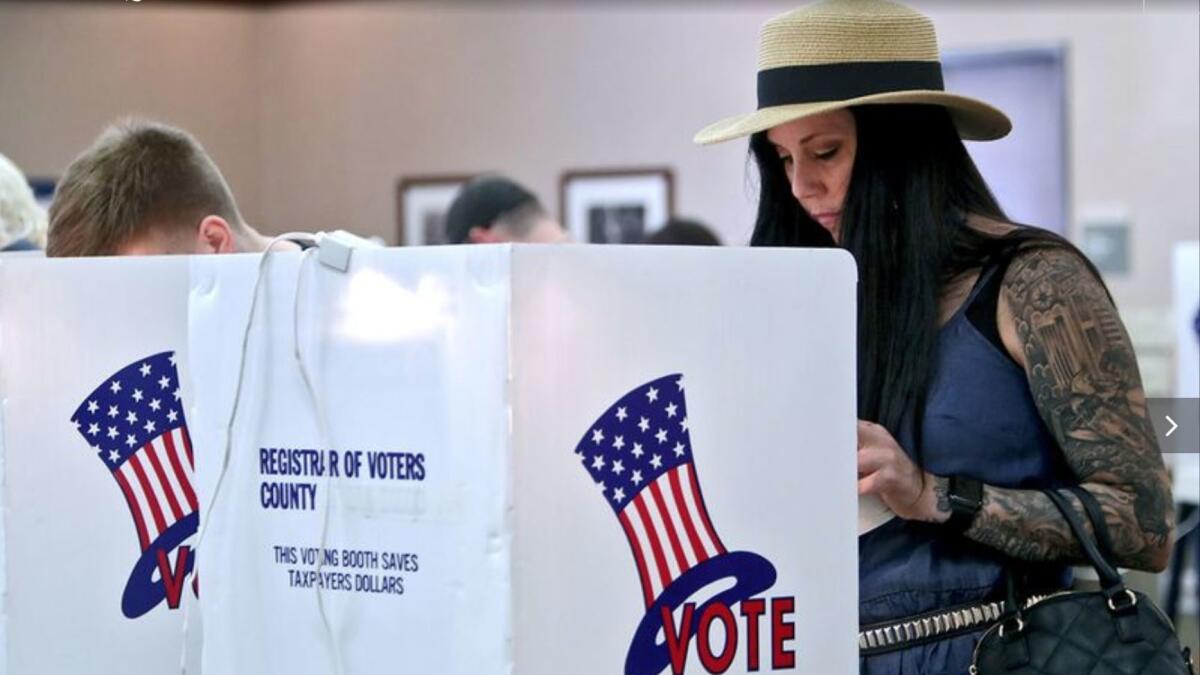Here’s what we learned from election day in California

- Share via
It’s going to take weeks for all the votes to be tallied in California, and it might be that long before a winner is declared in some close races. But already, the results are revealing. Here are five takeaways from election day in California:
California elections are expensive and the deepest pockets in initiative campaigns won
Total spending for all federal and state elections in California this year topped $1 billion for the first time, according to the California Target Book election guide. This tally includes the widely contested races for U.S. Congress, the gubernatorial election and statewide initiative campaigns.
Two propositions were among the most expensive in state history, topping $100 million in total fundraising. Opponents of Propositions 8 and 10 overwhelmed supporters with cash and won at the ballot box.
Proposition 8 aimed to shrink the profits of dialysis clinics across the state, and the dialysis industry raised more than $111 million alone to defeat it, according to top contributor data from the California Fair Political Practices Commission, nearly six times what labor union supporters donated.
Proposition 10 tried to expand rent control in California. But opponents, chiefly real estate investors with large apartment portfolios, raised nearly $80 million. That’s three times what the Los Angeles-based AIDS Healthcare Foundation and other supporters donated.
The Associated Press officially called both propositions as defeated Tuesday night. They are both trailing by 24 percentage points, the worst margin among the five measures that were trailing or had failed.
Women make history in statewide elections
Never before have women held more than two of California’s statewide constitutional offices at the same time. But Tuesday’s results changed that.
Eleni Kounalakis and Fiona Ma, both Democrats, won their respective races for lieutenant governor and treasurer. They will join State Controller Betty Yee, also a Democrat, who was reelected on Tuesday.
Voting is not a one-day affair in California
In every general election since 2012, more than half the ballots cast in the state have been by mail, not at the polls. It looks like Tuesday will set a new record for those who chose to vote via the post office.
This year, 78% of the 16.7 million registered voters in the state were sent a mail ballot, according to statistics from the California secretary of state and Political Data, a statewide voter data company. We won’t know the full turnout and breakdown for a while of those who chose to vote by mail, but the tally seems likely to top the 61% of voters who voted absentee in November 2014.
Democrats once again are eyeing a supermajority in the Legislature
Democrats are on the cusp of winning two-thirds of the seats in both the Assembly and state Senate. Democrat Anna Caballero leads by more than 1,000 votes in her race for a state Senate seat to represent parts of the Central Valley over Republican Rob Poythress, and Democrat Melissa Hurtado leads incumbent GOP Sen. Andy Vidak in the San Joaquin Valley.
If Caballero or Hurtado hold on, Democrats will earn their third supermajority in the Legislature since 2012.
The state Constitution requires a two-thirds vote in both houses to raise taxes and put measures on the statewide ballot, so Democrats wouldn’t need any support from Republicans to do either. Depending on the outcome in a handful of too-close-to-call Assembly races, Democrats could earn as many as 59 seats in the 80-person chamber.
But actually keeping an entire party caucus in line is easier said than done. In key recent supermajority votes to raise the gas tax, reauthorize the state’s cap-and-trade program and add a surcharge on real estate transactions, some legislators from both parties crossed the aisle.
Voters’ interest in borrowing money might have hit a bump
California voters tend to love borrowing money.
Prior to Tuesday, voters statewide had rejected just one bond measure that would have tapped the state’s day-to-day budget for repayment over the past decade, according to the nonpartisan Legislative Analyst’s Office. Voters approved $33 billion in new debt over the same period.
But Proposition 3, an $8.9-billion bond to finance water infrastructure improvements, was trailing 52% to 48% as of Wednesday morning. The only prior measure that failed over the last 10 years was a 2008 campaign financed by Texas oilman T. Boone Pickens that would have issued $5 billion in debt to help consumers purchase alternative energy vehicles.
Three other bond measures passed or looked poised to do so as of early Wednesday. Voters appeared to support $6 billion in loans to help finance low-income and homeless housing. And a proposal to borrow $1.5 billion to help expand the state’s network of children’s hospitals secured passage.
Times staff writer Taryn Luna contributed to this report.
More to Read
Get the L.A. Times Politics newsletter
Deeply reported insights into legislation, politics and policy from Sacramento, Washington and beyond. In your inbox twice per week.
You may occasionally receive promotional content from the Los Angeles Times.











